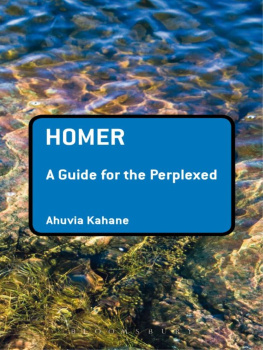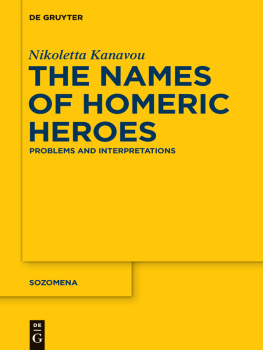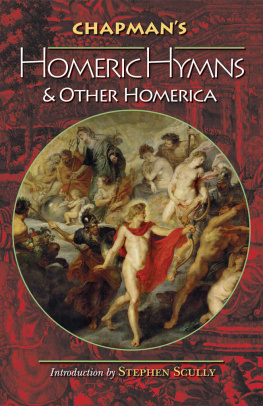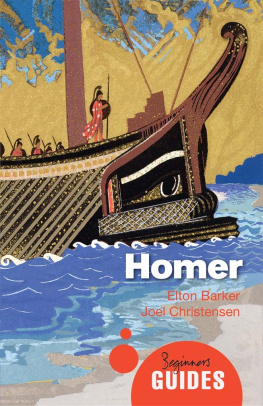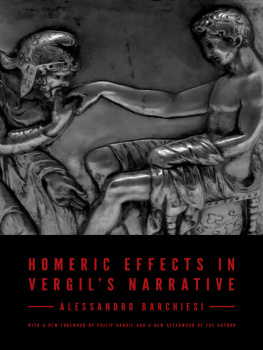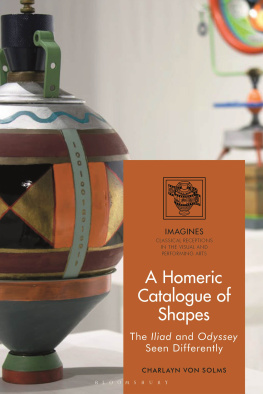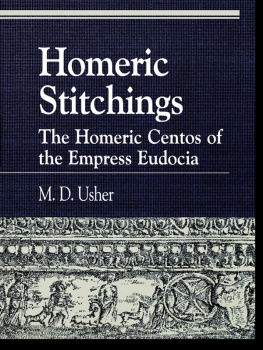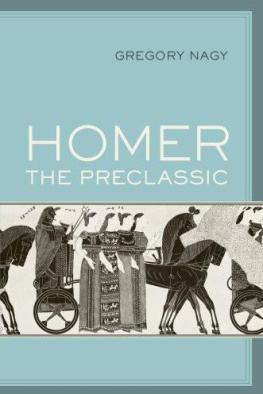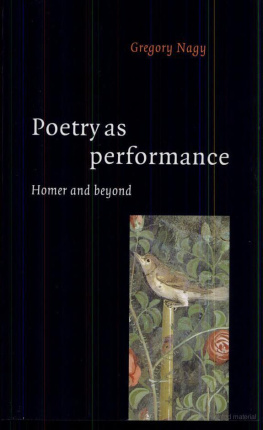Homer
A GUIDE FOR THE PERPLEXED
Homer
AHUVIA KAHANE

Bloomsbury Academic
An imprint of Bloomsbury Publishing Plc
50 Bedford Square London WC1B 3DP UK
175 Fifth Avenue New York NY 10010 USA
www.bloomsbury.com
First published 2012
Ahuvia Kahane, 2012
All rights reserved. No part of this publication may be reproduced or transmitted in any form or by any means, electronic or mechanical, including photocopying, recording, or any information storage or retrieval system, without prior permission in writing from the publishers.
Ahuvia Kahane has asserted his right under the Copyright, Designs and Patents Act, 1988, to be identified as Author of this work.
No responsibility for loss caused to any individual or organization acting on or refraining from action as a result of the material in this publication can be accepted by Bloomsbury Academic or the author.
British Library Cataloguing-in-Publication Data
A catalogue record for this book is available from the British Library.
ISBN: 978-1-4411-7306-5
Library of Congress Cataloging-in-Publication Data
A catalog record for this book is available from the Library of Congress.
CONTENTS
PREFACE
This short book appears in the series of Guides for the Perplexed whose purpose is to introduce major figures and works to students and general readers and especially, as the series title suggests, to explain challenging and difficult aspects of those works. This has particular significance in the case of Homer.
The Iliad and Odyssey are first and foremost stories to be read (or listened to) for pleasure. They are widely available in print, in translations into almost every language and in electronic form too. There are dozens of translations in English alone, in verse and prose, in versions that follow the original ancient Greek very closely (e.g. by Richmond Lattimore or Walter Shewring) and in others that take greater poetic liberties (such as Christopher Logues powerful War Music, Madelein Millers Orange Prize winner, The Song of Achilles or Alice Oswalds haunting Memorial). Readers who seek short, practical introductions to Homer and Homeric poetry and answers to basic questions will likewise find an abundance of informed introductions, handbooks, companions and encyclopaedias on the subject that outline important facts, characters, themes and contexts. And yet Homer, the first poet in the Western literary canon and one of its mainstays, demands and richly rewards deeper exploration. His poetry deals with some of the most difficult and long-standing poetic, historical and ethical questions ever raised.
Homeric questions have of course been perplexing and fascinating readers, poets, philosophers, politicians, businessmen (Heinrich Schliemann, the father of Homeric archaeology, was a banker in California during the Gold Rush), beginner students and seasoned scholars for over two and a half millennia longer than any other literary and historical questions in the classical tradition. The range of creative and reflective responses, artistic and learned, to Homer is vast. Merely in the last 100 years, almost 15,000 (!) specialist books and articles dedicated to the study of Homer have been written. The number of literary, dramatic, cinematic works, works in painting, sculpture and other media, that relate to the Iliad and Odyssey is hard, if not impossible, to count. With such bewildering abundance, there is more than one persuasive answer to every question about Homer. It can be difficult to find ones way around, not least since many of the most significant developments in our understanding of Homers poetry and its background are phrased in a highly technical language. Yet this abundance perplexing, difficult, resistant to simple solutions is also what defines the special richness of Homer and the Homeric tradition. To have put it aside would have produced a more convenient but less truthful introduction. What I have therefore tried to do in this book is to present some of the main facts, features and approaches to Homer and to characterize them as plainly as I could without masking the complexity of the questions and the exciting, open, meditative themes that give the Iliad and Odyssey their beauty and ensure their continuing resonance.
This book was written during a period of leave from my duties as a member of the Classics and Philosophy Department and Directory of the Humanities and Arts Research Centre at Royal Holloway, University of London. I am grateful to the Faculty of Arts for providing additional support and, earlier, to the Department of Classics at the University of Cincinnati, for providing me with a Titus Fellowship, during which I had considered some of the issues of presentation and range of this book. Many friends and colleagues have provided encouragement and advice as this book was being written. However, most of all I would like to thank the many graduate students who had taken my University of London Inter-Collegiate Homer course, and from whom, over several years, I had learned a great deal about Homer.
CHAPTER ONE
The figures of Homeric poetry
A beginning for all time
The Iliad and Odyssey are among the best known poems in the West and increasingly in other parts of the world, and they are widely acknowledged as the beginning of the Western literary canon. They are good stories, well-loved and deceptively easy to read. The Iliad is a tale of war; the Odyssey is a tale of the return from war. The two Homeric poems are very different from each other, but their narratives, contents, characters, style and traditions are closely entwined. Together they tell at some length conventionally, 27,803 lines a plot which is the Wests oldest and most famous point of literary departure. The beginning, we might say, of a very long line.
The first poem, the Iliad, deals with a conflict that occupies a central position in the collective memory of the ancient Classical world the Trojan War. It is a story of countless woes, of spears and shields, chariots and horses, fear and pity, fury and grief, blood and dust. The first word of the very first line of the Iliad is mnis, wrath. It is the theme of the poem and also the first word of European Literature. It offers a harsh forewarning of things to come. The poem makes a rapid start as one might expect from the first poem launching into extended narratives of violence and conflict. By the time we have traversed the poems 24 books and reached the last words, the tone has changed to one of mourning, pity and lament reflections on wrath as a destructive force, on death and the past. The last line of the poem rounds off the burial of a hero, Hector, Tamer-of-Horses, who was a husband, a son, a friend and the emblem of the citys defence. Without him, the high citadel of Troy will fall.
And indeed, beyond the horizon of the Iliads last verse lie the inevitable flames of destruction. Western literature here takes its first, dark, measured steps. Measured not only because Homeric poetry is composed in formal, repetitive (and technically complex) metrical verse (each line has the same basic rhythm and involves intricate formulae or set groups of words), but no less because of Homers meticulously crafted thought and poetics, his studied descriptions of physical violence and extreme emotion and because of the claims made by the poems themselves, not merely to tell a story, but to preserve the fame (

